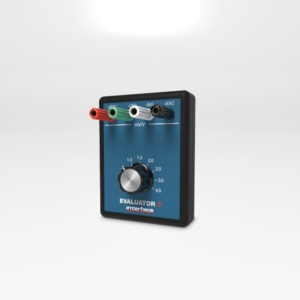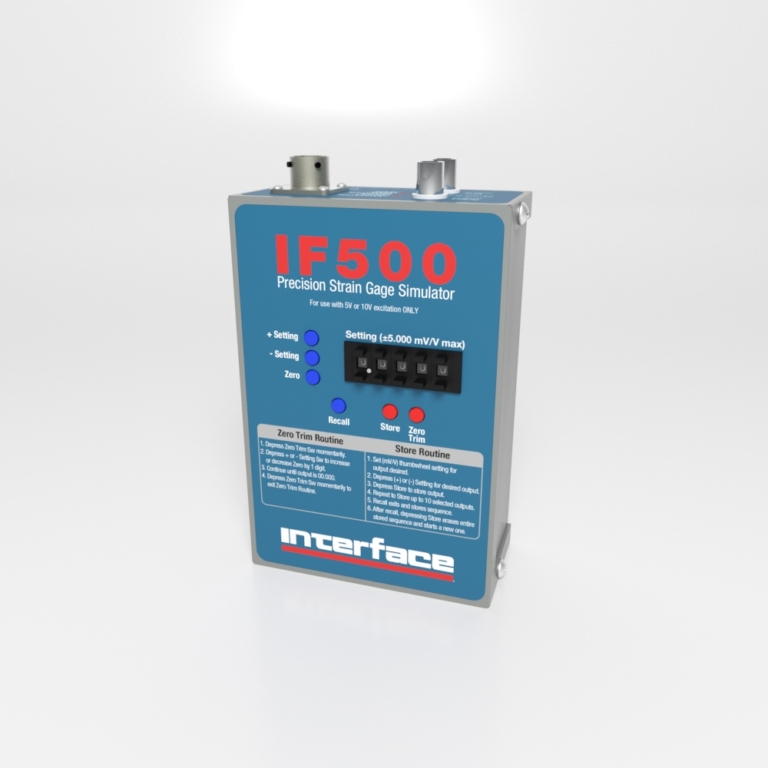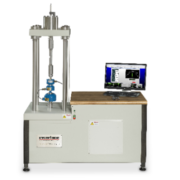Load Cell Simulator 101
 A load cell simulator is a device that mimics the electrical signal of a load cell. This allows technicians to test and calibrate measurement systems without applying physical force or weight to the load.
A load cell simulator is a device that mimics the electrical signal of a load cell. This allows technicians to test and calibrate measurement systems without applying physical force or weight to the load.
By generating a range of input signals using a load cell simulator, technicians can assess the instrument’s linearity, sensitivity, and accuracy, ensuring it meets the required specifications.
The two most common uses for load cell simulators are troubleshooting and calibration. Load cell simulators can effectively troubleshoot force measurement systems, detecting and isolating faults or malfunctions. By simulating various load conditions and injecting fault conditions, technicians can pinpoint the source of the problem, such as a broken wire or a faulty load cell.
Load cell simulators are essential for calibrating force measurement devices, ensuring they accurately translate applied force into a measurable electrical signal. By generating a controlled force signal, technicians can compare the displayed value to the known input signal, identifying discrepancies and adjusting the device accordingly.
Interface load cell simulators are part of our accessories product line. They are an essential accessory and valuable investment for any testing lab or research facility frequently using load cells. These simulators can help to improve safety, reduce downtime, improve accuracy, lower costs, and increase convenience.
Why Use a Load Cell Simulator?
- Testing and monitoring force measurement systems: Load cell simulators can test instrumentation performance used in force measurement systems, such as hydraulic presses, assembly machines, and material testing machines. By simulating forces that the system would typically encounter, the simulator can help identify potential problems with the instrumentation, ensuring that the system operates safely and efficiently.
- Verifying proper indicator setup: Load cell simulators can be used to verify that an indicator is configured correctly for the type of load cells being used. This includes checking the scaling and the instrument’s linearity.
- Cable checks: One of the first troubleshooting tips for any load cell application is to check the cables and connectors. A load cell simulator is valuable for checking cables.
- Scaling: Load cell simulators are crucial for scaling force measurement devices, enabling precise calibration, troubleshooting, and testing. They play a vital role in ensuring the accuracy and reliability of force measurements across various industries.
- Calibrating scale indicators: Load cell simulators can generate a precise mV/V signal corresponding to a specific weight. This allows technicians to calibrate scale indicators to ensure that they are displaying accurate weight readings.
- Application evaluation: Load cell simulators can be used to develop and troubleshoot force-related applications, such as medical devices, prosthetics, and exercise equipment. By simulating forces that users would typically apply, the simulator can help to ensure that the application is safe, effective, and operational.
- Research and product development: Load cell simulators can be used to research new force measurement applications.
- Technician training: Load cell simulators can educate and train technicians on the proper use and calibration of load cells.
Interface Load Cell Simulators
CX SERIES PRECISION MV/V TRANSFER STANDARD LOAD CELL SIMULATOR
 Model CX Series Precision mV/V Transfer Standard is the market’s most accurate load cell simulator. This NIST Traceable product is commonly used to calibrate and check instruments in accredited labs.
Model CX Series Precision mV/V Transfer Standard is the market’s most accurate load cell simulator. This NIST Traceable product is commonly used to calibrate and check instruments in accredited labs.
- Most accurate load cell simulator
- Special low thermal EMF construction
- Each unit is individually calibrated, aged, and recalibrated
- Strong, rugged design
- Instrument substitution testing
In the series, models CX-0202, CX-0610, CX-0440, CS-0330, and CX-0220 are used to set up and check the Gold Standard® System Hardware. CX-0440, CX-0330, and CX-0220 are single-step mV/V transfer standards providing precision outputs of ±4, ±3, and ±2 mV/V respectively. CX-0610 is a multi-step unit that allows the user to go from -6 mV/V to +6 mV/V in 1 mV/V steps. Model CX-0404 is specifically designed for instrument substitution testing as per ASTM E74.
EVALUATOR 3 LOAD CELL SIMULATOR
 The Evaluator 3 variable range simulator is well suited for basic troubleshooting needs, offering nine fixed intervals from -5 mV/V to +4.5 mV/V.
The Evaluator 3 variable range simulator is well suited for basic troubleshooting needs, offering nine fixed intervals from -5 mV/V to +4.5 mV/V.
- ABS plastic case
- Weighs less than 1 lb (0.45 kg)
- Fixed rotary switch, -0.5 mV/V to 4.5 mV/V in 9 steps of 0.5mV/V per step
- Used in testing and troubleshooting mV/V instrumentation
IF500 LOAD CELL SIMULATOR
The new model IF500 is a 5V or 10V excitation-only load cell simulator with a state-of-the-art microprocessor-based design. It is a cost-effective simulator with advanced instrumentation capabilities. The instrument excitation supply powers the IF500 and requires no batteries.
 Set “ANY” mV/V value within ±5mV/V
Set “ANY” mV/V value within ±5mV/V- State-of-the-art, microprocessor-based design
- Sleep mode eliminates digital clock noise
- Powered by instrument excitation supply… No batteries
- Buffered Ratiometric output
- 350-ohm bridge configuration
- Stores up to 10 settings with sequential recall
- Digital zero trim and storage
- Low noise, low quiescent current, low-temperature coefficient, high stability amplifiers
- Compatible with instruments using 5V or 10V excitation, including Interface’s instrument models 9820, 9840, 9860, 9870, 9890, CSC/CSD, DMA/DMA2, DCA, INF1/INF4, ISG, SGA, and VSC
- Options include: NIST Traceable Calibration Certificate, Screw Terminal Adapters for the BNC Connectors and Cable Adapters
Application Examples for Load Cell Simulators
Manufacturing: Load cell simulators are essential for calibrating and testing force measurement devices used in manufacturing processes, ensuring accurate force control and product consistency. ADDITIONAL RESOURCE: Manufacturing Solutions.
Food Processing: Load cell simulators are critical in calibrating and troubleshooting force measurement devices, ensuring precise portion control, and maintaining food safety standards. ADDITIONAL RESOURCE: Force Measurement for Efficiency in Food Processing and Packaging
Construction: Load cell simulators are employed for testing and calibrating force measurement devices used in construction applications, such as crane load monitoring and material testing. ADDITIONAL RESOURCE: Construction Solutions
Medical Devices: Load cell simulators are utilized for calibrating and verifying the accuracy of force measurement devices in medical applications, such as patient weighing scales and rehabilitation equipment. ADDITIONAL RESOURCE: Medical and Healthcare
Interface load cell simulators are indispensable tools for scaling force measurement devices, providing a safe, efficient, and cost-effective means to ensure the accuracy and reliability of force measurements across diverse industries. Their ability to calibrate, troubleshoot, and test force measurement devices contributes to product quality, process control, safety, and regulatory compliance, making them essential for maintaining the integrity of force measurement systems.








